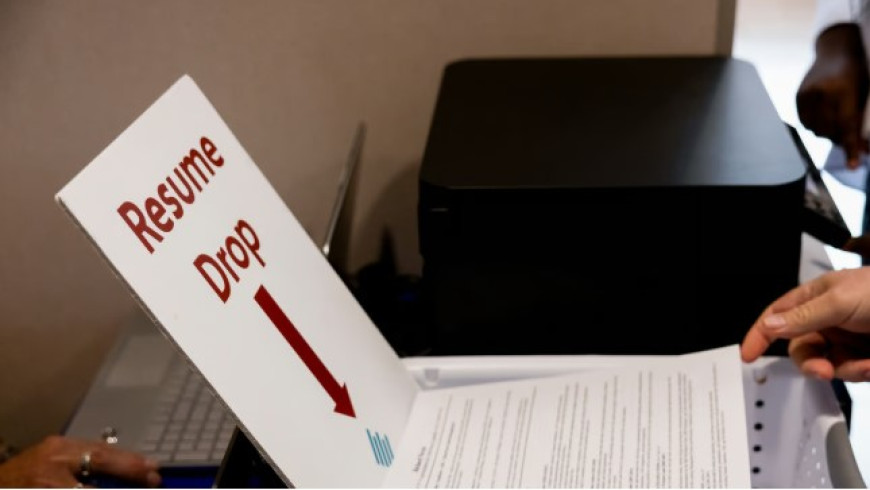
The number of Americans filing initial claims for jobless benefits fell to 328,000 last week, the lowest in more than three years, a government report showed.
Initial claims dropped by 14,000 from 342,000 the week before, the Labor Department said in Washington. Last week's filings were the fewest since 320,000 in the week ended Jan. 13, 2001, before President George W. Bush took office. Claims have averaged 349,700 this year, down from 402,100 for all of 2003.
Improving corporate profits are lifting business confidence and making it possible for companies including glassmaker Corning Inc. and ammunition producer Alliant Techsystems Inc. to hire. Payrolls jumped by 308,000 last month, the biggest increase in almost four years. Increased demand has made it harder for companies to rely on productivity gains from existing workers.
``Jobs are beginning to pick up, and we expect that to continue,'' said Joshua Shapiro, chief U.S. economist at Maria Fiorini Ramirez Inc., a New York forecasting firm. Companies ``have finally reached the point they have to hire people.''
Shapiro predicted that the economy will add on average 175,000 to 200,000 jobs a month for the rest of the year. He had prediction a drop in last week's claims to 335,000. That matched the lowest estimate in a Bloomberg News survey of 42 economists, in which the median projection was 340,000.
The benchmark 10-year U.S. Treasury note fell 7/32 point, pushing its yield up 3 basis points to 4.19 percent at 9:41 a.m. in New York. The Standard & Poor's 500 Stock Index rose 8.2 points, or 0.7 percent.
Jobless Rolls Shrink
The four-week average of claims, a less-volatile indicator, dropped to 336,750, the fewest since the week ended Nov. 25, 2000, from 340,000 the previous week.
The number of people continuing to collect state jobless benefits fell to 3.01 million in the week that ended March 27, the fewest since July 2001, from 3.05 million a week earlier. The statistics are reported on a one-week delay.
The insured unemployment rate, which tends to track the U.S. jobless rate, held at 2.4 percent the week before last. The Labor Department also said 31 states and territories reported a decrease in new claims, while 22 reported an increase.
Corning, the world's largest maker of fiber-optic cable, yesterday was to open a new, $200 million factory in Corning, New York, that will employ 250, and it has added as many as 35 researchers in Corning over the past six to eight months, said spokesman Daniel Collins in an interview Monday.
Alliant Techsystems, the biggest supplier of ammunition and rocket motors to the American military, has expanded the capacity of Independence, Missouri, factory and plans to add 800 workers in the next 12 months, said Steve Wold, director of investor relations, in an interview Tuesday. The company is based in Edina, Minnesota.
Bush's Re-Election
The rebound in hiring may help Bush, 57, blunt criticism from Democratic challenger John Kerry, 60, over the loss of 1.8 million jobs during his administration. Kerry, a Massachusetts senator, has proposed a plan that he says will create 10 million jobs in four years. Bush has said tax cuts his administration won have spurred the economy and will lead to job gains.
The March jump in job creation ``probably eased a lot of anxieties about the sustainability of the recovery,'' said Jason Trennert, chief investment strategist in New York at ISI Group Inc., in an interview today. ``The real question was whether the economic recovery would be self-sustaining, and I think if you do get employment gains, it increases the chance that this recovery will do a little bit better.''
Stock analysts project that members of the S&P 500 will report an average increase of 17.1 percent in first quarter profits, up from their Jan. 1 estimate of 13.4 percent, according to Thomson Financial.
Profits and Jobs
``The bigger the first-quarter profits, the better the jobs outlook,'' said Robert DiClemente, an economist at Citigroup Global Markets Inc. in New York, in a research report Monday.
Fourth-quarter corporate profits, after taxes and adjusted for the value of inventories and capital depreciation, grew 7.6 percent to a record $961.9 billion at an annual rate and were up 31 percent from the same quarter in 2002, the Commerce Department reported last month. By that measure, profits also reached a record 8.5 percent of gross domestic product in the last three months of 2003, according to economists at Morgan Stanley.
The New York-based Conference Board's index of business confidence rose to 73 in this year's first quarter from 66 in the final three months of 2003, the private research group reported this week, based on a quarterly survey of chief executives. The reading was the highest since 74 in the last quarter of 1983. Half of the more than 100 CEOs surveyed said they expect to hire this year.
Employers announced plans in March to cut the fewest jobs in nine months, according to figures Tuesday from Challenger, Gray & Christmas Inc., a Chicago-based placement firm. The number of planned payroll reductions dropped 20 percent from a year ago to 68,034. Last month's announced cuts were down 12 percent from February's 77,250 and the fewest since 59,715 in June 2003.
Initial claims dropped by 14,000 from 342,000 the week before, the Labor Department said in Washington. Last week's filings were the fewest since 320,000 in the week ended Jan. 13, 2001, before President George W. Bush took office. Claims have averaged 349,700 this year, down from 402,100 for all of 2003.
Improving corporate profits are lifting business confidence and making it possible for companies including glassmaker Corning Inc. and ammunition producer Alliant Techsystems Inc. to hire. Payrolls jumped by 308,000 last month, the biggest increase in almost four years. Increased demand has made it harder for companies to rely on productivity gains from existing workers.
``Jobs are beginning to pick up, and we expect that to continue,'' said Joshua Shapiro, chief U.S. economist at Maria Fiorini Ramirez Inc., a New York forecasting firm. Companies ``have finally reached the point they have to hire people.''
Shapiro predicted that the economy will add on average 175,000 to 200,000 jobs a month for the rest of the year. He had prediction a drop in last week's claims to 335,000. That matched the lowest estimate in a Bloomberg News survey of 42 economists, in which the median projection was 340,000.
The benchmark 10-year U.S. Treasury note fell 7/32 point, pushing its yield up 3 basis points to 4.19 percent at 9:41 a.m. in New York. The Standard & Poor's 500 Stock Index rose 8.2 points, or 0.7 percent.
Jobless Rolls Shrink
The four-week average of claims, a less-volatile indicator, dropped to 336,750, the fewest since the week ended Nov. 25, 2000, from 340,000 the previous week.
The number of people continuing to collect state jobless benefits fell to 3.01 million in the week that ended March 27, the fewest since July 2001, from 3.05 million a week earlier. The statistics are reported on a one-week delay.
The insured unemployment rate, which tends to track the U.S. jobless rate, held at 2.4 percent the week before last. The Labor Department also said 31 states and territories reported a decrease in new claims, while 22 reported an increase.
Corning, the world's largest maker of fiber-optic cable, yesterday was to open a new, $200 million factory in Corning, New York, that will employ 250, and it has added as many as 35 researchers in Corning over the past six to eight months, said spokesman Daniel Collins in an interview Monday.
Alliant Techsystems, the biggest supplier of ammunition and rocket motors to the American military, has expanded the capacity of Independence, Missouri, factory and plans to add 800 workers in the next 12 months, said Steve Wold, director of investor relations, in an interview Tuesday. The company is based in Edina, Minnesota.
Bush's Re-Election
The rebound in hiring may help Bush, 57, blunt criticism from Democratic challenger John Kerry, 60, over the loss of 1.8 million jobs during his administration. Kerry, a Massachusetts senator, has proposed a plan that he says will create 10 million jobs in four years. Bush has said tax cuts his administration won have spurred the economy and will lead to job gains.
The March jump in job creation ``probably eased a lot of anxieties about the sustainability of the recovery,'' said Jason Trennert, chief investment strategist in New York at ISI Group Inc., in an interview today. ``The real question was whether the economic recovery would be self-sustaining, and I think if you do get employment gains, it increases the chance that this recovery will do a little bit better.''
Stock analysts project that members of the S&P 500 will report an average increase of 17.1 percent in first quarter profits, up from their Jan. 1 estimate of 13.4 percent, according to Thomson Financial.
Profits and Jobs
``The bigger the first-quarter profits, the better the jobs outlook,'' said Robert DiClemente, an economist at Citigroup Global Markets Inc. in New York, in a research report Monday.
Fourth-quarter corporate profits, after taxes and adjusted for the value of inventories and capital depreciation, grew 7.6 percent to a record $961.9 billion at an annual rate and were up 31 percent from the same quarter in 2002, the Commerce Department reported last month. By that measure, profits also reached a record 8.5 percent of gross domestic product in the last three months of 2003, according to economists at Morgan Stanley.
The New York-based Conference Board's index of business confidence rose to 73 in this year's first quarter from 66 in the final three months of 2003, the private research group reported this week, based on a quarterly survey of chief executives. The reading was the highest since 74 in the last quarter of 1983. Half of the more than 100 CEOs surveyed said they expect to hire this year.
Employers announced plans in March to cut the fewest jobs in nine months, according to figures Tuesday from Challenger, Gray & Christmas Inc., a Chicago-based placement firm. The number of planned payroll reductions dropped 20 percent from a year ago to 68,034. Last month's announced cuts were down 12 percent from February's 77,250 and the fewest since 59,715 in June 2003.














 3287.99
3287.99 1275.09
1275.09